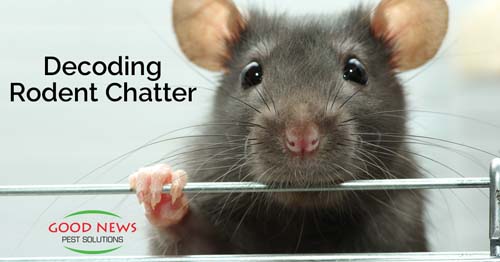
Rodent Chatter: Figuring Out the Code
Artificial neural networks is a popular buzz phrase these days. For years, they’ve been improving speech recognition, giving rise to Alexa and Siri. Facebook is trying to put them into play to filter fake news from real. Google’s using them to improve their mapping software and develop self-driving cars. And two scientists in Washington state are using them to hear and decode the language of rats and mice.
Squeak’s the Word
Typically, we think of rodents as pesky diggers who try and get into our homes, especially this time of year when the temperatures are a little cooler. Or they’re our helpful compatriots, caged in a lab to assist scientists in confirming theories that can’t be tested on humans – like cloning and how saccharine causes cancer. But unless they’ve got a motorcycle like Ralph or a genius intellect like Algernon, most of us don’t really care what they’re saying. Or that they can communicate in sound spectrums far beyond our capability to hear. But for the researchers in those aforementioned labs, they felt that understanding the vocalizations of the rodents could lead to better, faster breakthroughs in medical research. So they developed DeepSqueak. The program translates the mice and rats chirping and squealing, including the utterances we can’t hear, and feeds it into a visual biometric graph, similar to what they’re using for the self-driving cars. They identified 20 different kinds of calls among the rodent population. Including determining that two male mice will sing differing courtship songs to females they can smell close by.
The Higher Purpose
But we know what you’re probably thinking. This is interesting, sure. But does any of it translate to an early warning rat device I can install in my home? Sadly, that’s not the case yet. But the research does have a more wide-ranging purpose. By using the DeepSqueak technology in conjunction with task-reward and rodent socialization, researchers can target the sounds of stress, anticipation, and pleasure. Taking this data and comparing it to brain imaging, scientists at the University of Washington are enhancing their study of the psychological aspects of drug addiction. By isolating and identifying standard rodent chatter, researchers can study the changes in that chatter when exposing the rats and mice to certain drugs and alcohol, and when they remove those substances after exposing and addicting the creatures to them. The scientists hope that this will lead to better, less invasive, and safer treatments for drug addiction.
But… My House!
Nobody wants rats or mice in their home, but when temperatures get cooler, it’s more likely to happen. Especially in you’re in an area with new construction that may be pushing the creatures out of their native habitats. Our comprehensive Premier Rodent Program prevents them from entering your home and humanely removes them if they’re already there, as well as nearby populations. This is also a good time of year to look into bat exclusions, before we get into the annual bat maternity season in April. Once it starts, they can’t be moved. For information on this or any of the other risk-reduced products we offer from Apollo Beach to Punta Gorda, contact us today!
« Back to BlogProudly Serving
Sun City Center, Ruskin, Palmetto, Parrish, Ellenton, Bradenton, Anna Maria, Holmes Beach, Bradenton Beach, Longboat Key, Lakewood Ranch, University Park, Myakka City, Sarasota, Siesta Key, Osprey, Nokomis, Casey Key, Venice, Englewood, North Port, Port Charlotte, Punta Gorda, Arcadia
Things You Can Do
Pay Your Bill Online
Leave Us a Review
Request a Free* Termite Inspection
Stop Mosquito Bites
Get Rid of Rodents
Get a Termite Damage Warranty
Get Pest Control for Your Attic
Get Pest Control for Your Business Request Prayer
Corporate Address
1080 Enterprise Court, Ste A
North Venice, FL 34275
Call Now: (941) 412-9610
Text: (941) 412-9610
Fax: (941) 412-0080
